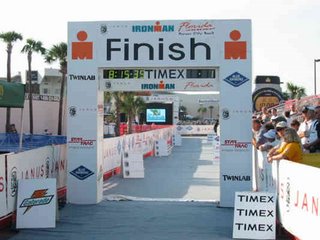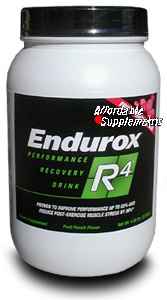 I open my arms, raise my eyebrows, stretch my mouth from ear to ear and roar a hardy CONGRATULATIONS to all you Ironman Floridians. You did it. You got yourself to the starting line. I hear it was a pretty challenging day out there, so you may have even gotten yourself to the finish. Either way, you are an Ironman!! (...and I can only hope that they yelled those words for you when you crossed the finish line. "You Are an Ironman!!" They are very special words and a defining moment that provides closure to such an emotional accomplishment. Truth be told, they didn't say them for me when I crossed the finish line at Ironman USA. They didn't say them for Catherine either. I played the video over again and again and they definitely did not yell You Are An Ironman for either of us. Not even close. Not that I'm bitter or anything. I mean, I only dreamed of hearing those words for 15 years. No really, it's OK.)
I open my arms, raise my eyebrows, stretch my mouth from ear to ear and roar a hardy CONGRATULATIONS to all you Ironman Floridians. You did it. You got yourself to the starting line. I hear it was a pretty challenging day out there, so you may have even gotten yourself to the finish. Either way, you are an Ironman!! (...and I can only hope that they yelled those words for you when you crossed the finish line. "You Are an Ironman!!" They are very special words and a defining moment that provides closure to such an emotional accomplishment. Truth be told, they didn't say them for me when I crossed the finish line at Ironman USA. They didn't say them for Catherine either. I played the video over again and again and they definitely did not yell You Are An Ironman for either of us. Not even close. Not that I'm bitter or anything. I mean, I only dreamed of hearing those words for 15 years. No really, it's OK.)
Whether they said those words or not, you put in the training and gave it your best throughout the day. You are an Ironman and nobody can ever take that away from you. Go ahead, make that appointment for the tattoo.
So now that you have an extra 15-20 hours available in your week, whatcha gonna do? Eat? Probably. Sleep? I doubt it. Exercise? You'll most likely want to do that soon enough. So let me do you a favor and give you some Post-Ironman Recovery advice. And take this from somebody that didn't follow this advice and didn't end up recovering until three long, grueling, painfully demeaning months after his Ironman. You don't want to do what I did for Ironman recovery. Which basically consisted of sitting around for a week or two and then going out on some slow runs and easy bike rides. But with the legs were feeling so strong, those easy bike rides quickly turned into uphill surges and all out sprints, and those slow runs turned into 8 milers with quarter mile pick-ups. Hell, I was an Ironman and I wanted everybody to see how fit I was.
So let me do you a favor and give you some Post-Ironman Recovery advice. And take this from somebody that didn't follow this advice and didn't end up recovering until three long, grueling, painfully demeaning months after his Ironman. You don't want to do what I did for Ironman recovery. Which basically consisted of sitting around for a week or two and then going out on some slow runs and easy bike rides. But with the legs were feeling so strong, those easy bike rides quickly turned into uphill surges and all out sprints, and those slow runs turned into 8 milers with quarter mile pick-ups. Hell, I was an Ironman and I wanted everybody to see how fit I was.
It kinda backfired.
Don't be an idiot like me.
So let me give you the best Post-Ironman Recovery advice I can find, courtesy of UltraFit.com and Patrick McCrann (don't know him personally, but gotta give the props to the person who wrote this). (For the record, Catherine found this article a couple of months after we finished Ironman and we both wished we would've read it a lot sooner...)
Here goes... Take notes...
***************
Most folks emerge from the race relatively unscathed; some even feel good enough to train within a day or two! Despite how you feel, it's important to allow your body to completely recover in order to reap the full benefits of the race. Here's what happened to you on race day, how it happened and how you can ensure full recovery.
The vast majority of folks race an Ironman at an endurance pace (primarily Friel Zone 2) with minimal intensity. Combine this relatively lower intensity/effort with plenty of opportunities to eat and drink, and the body actually holds up pretty well. For most, the biggest challenge on race day is a mental, not a physiological, one. So the days after the race come and go, and you feel pretty good. If you have ever run a stand-alone marathon, you know what I mean when I say that the post-race effects of that "harder" running are much worse than those of the Ironman.
I recommend the following post-Ironman recovery protocols. In addition to the general outline below, athletes should consider a massage (or two) and a serious investment in a yoga or similar flexibility program for that first post-Ironman month.Week One: As the initial days pass, you actually feel better. You are psyched about your Ironman finish and excited about the future. Maybe you even signed up for next year's race. Whatever is on your mind, chances are -- exercise isn't. And that's a good thing. Your biggest workout right now should be some quality walking with one or two very short swims.
Weeks Two and Three: This is the Honeymoon Phase, where you feel good enough to work out, but really shouldn't. If you actually push yourself here, you'll find that after 45 minutes to an hour, you simply run out of power. Your heart rate will drop and no amount of food or coffee will revive you. Exercise in this period should be no longer than an hour and should be done at a very light intensity. Overdoing it here can really set you back later in your year. Extended swims and light cycling should compose the majority of your program.
Week Four and Beyond: This is the Transition Phase. If you have been recovering well and have felt good enough to include some consistent aerobic activity, then you could be ready to transition back to your regular training. A key test to see if you have made the transition is a 90 to 120-minute ride with some intensity/intervals. If you are able to hold a solid effort/wattage on multiple intervals, and you are able to recover the next day with no minimal aftereffects, then you are back. Some lighter running can also be included at this time.
Managing your recovery post-Ironman is almost as critical as preparing for the event itself. Be sure to take the time and savor what you have accomplished...the pool and the roads will still be there when you are ready to make your comeback!

0 comments:
Post a Comment